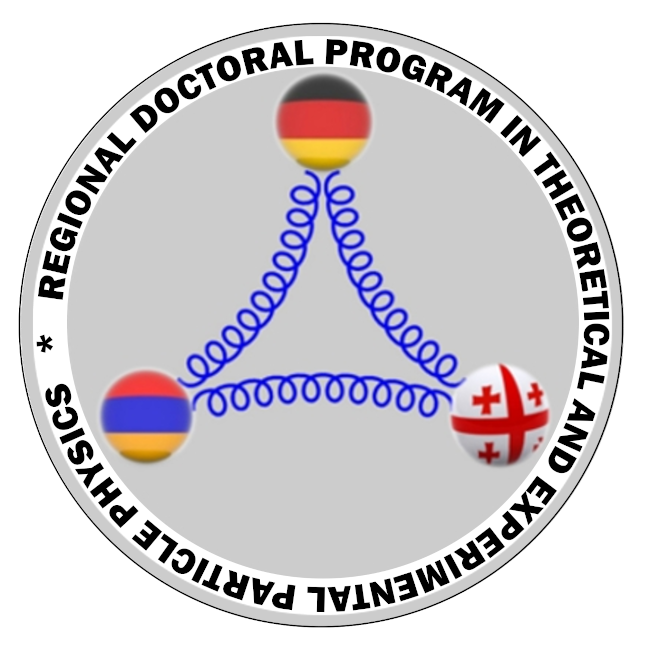
Online
published April 23, 2021
Each year since 2013, the international collaboration "Regional Doctoral Program in Theoretical and Experimental Particle Physics" (until 2018, it was called the "Regional Network in Theoretical Physics"), which comprises different Universities and research institutions in Germany, Georgia and Armenia, organizes a PhD school and an accompanying scientific workshop in Georgia or Armenia. During these years, the event has become popular both among the experienced researchers and the students in a wider region, including — besides Georgia and Armenia — also Turkey, Iran, Azerbaijan, Russia and Ukraine. In 2020, due to the problems related with the COVID-19 pandemic, the 8th traditional meeting was held at a smaller scale, in the form of a two-days online workshop "Recent Advances in Mathematical Physics," which took place on December 5 and 6.
The main purpose of the collaboration "Regional Doctoral Program in Theoretical and Experimental Particle Physics" is the implementation of a structured doctoral training in the field of particle physics at the Universities of Georgia and Armenia, bringing the quality of the doctoral education in these countries closer to the standard that are accepted at the leading Universities worldwide. A close collaboration with the German colleagues from the Universities of Bonn, Siegen and Forschungszentrum Jülich, who have rich experience in running such programs, plays a decisive role for the success of the project. This project is funded by the Volkwagenstiftung, with the participation of Shota Rustaveli National Science Foundation (Georgia), the Science Committee of Armenia, Tbilisi State University, Yerevan Physics Institute Yerevan State University and the ICTP (Trieste, Italy).
More information about the project can be found on the website of the collaboration:
http://training.hepi.tsu.ge/StructDoctProg/index.shtml
The main topic of the present workshop was classical and quantum integrability and their applications. The aspects of integrability presented at the workshop included topics like integrable sigma-models, superintegrable systems, Yang-Mills and higher spin theories, conformal field theory, as well as integrable models of supersymmetric mechanics, etc. The proceedings, in addition, include a short PhD lecture course on integrable systems, which was delivered within the framework of the present project for the Armenian students by G. Arutyunov (University of Hamburg) earlier this year.
Editorial Board
- George Jorjadze
Free University of Tbilisi and Razmadze Mathematical Institute of Tbilisi State University - Ulf-Gerrit Meißner
HISKP, Bonn University and IAS-4, FZ Jülich - Armen Nersessian
Yerevan Physics Institute - Akaki Rusetsky
HISKP, University of Bonn and Tbilisi State University

| Sessions |
|---|
| Session 1 |
| Session 2 |
| Session 3 |
| Session 4 |
| Session 5 |
| Session 6 |
| Session 1 |
|---|
|
Lectures on Integrable Systems
|
|
Exactly solvable Hamiltonians in quantum computing
|
| Session 2 |
|
Correlation Functions of Classical and Quantum Artin System defined on Lobachevsky Plane
|
|
Non-compact Complex Projective Superspaces by Hamiltonian reduction
|
|
Universal dimensions of simple Lie algebras and configurations of points and lines
|
|
Superintegrable systems related to truncated Calogero model
|
| Session 3 |
|
Split-Quaternion Analyticity and (2 + 1)-Electrodynamics
|
|
Split Octonions and Triality in (4+4)-Space
|
|
Electric field driven flat bands in S = 1/2 sawtooth chain
|
|
Solitons in normal Fermi liquid
|
| Session 4 |
|
Electromagnetic knots from de Sitter space
|
|
Local quartic interaction of scalars with higher spin gauge fields and commutator of linear gauge transformations
|
| Session 5 |
|
Generating Functional for the S-Matrix in Liouville Theory
|
|
Helicity and infinite spin representations of the Poincare group in 6D
|
|
Bogomolny equations from the Pseudoanalytic Functions Viewpoint
|
|
Computation on conformal moduli of Quadrilaterals
|
| Session 6 |
|
N = 2 Calogero models within superfields
|
|
New approach to ${\cal N}{=}\,2$ supersymmetric Ruijsenaars–Schneider model
|
|
SU(2|1) chiral superfields and spinning models
|
|
Integrable models with inverse square potential inmaximally symmetric Kähler manifolds
|
